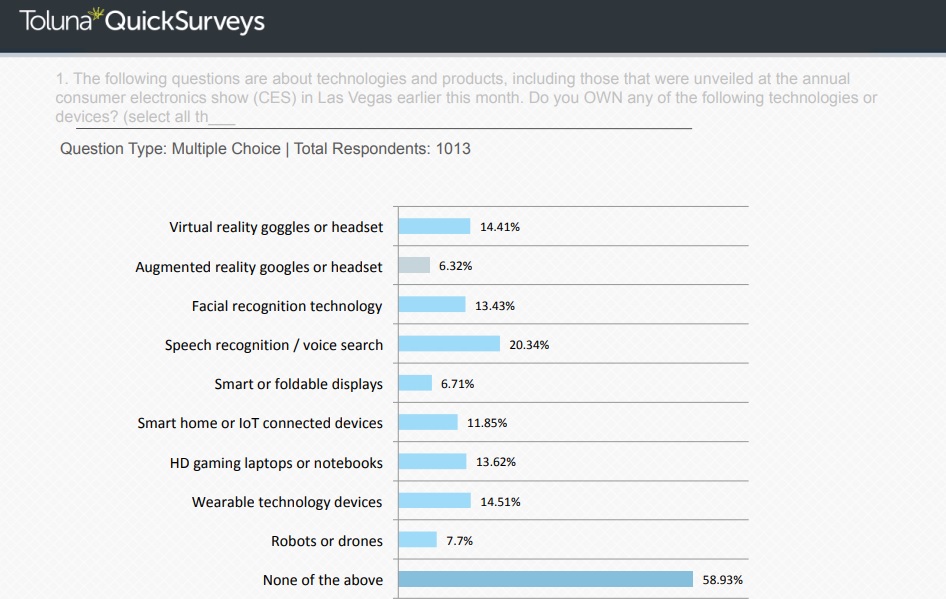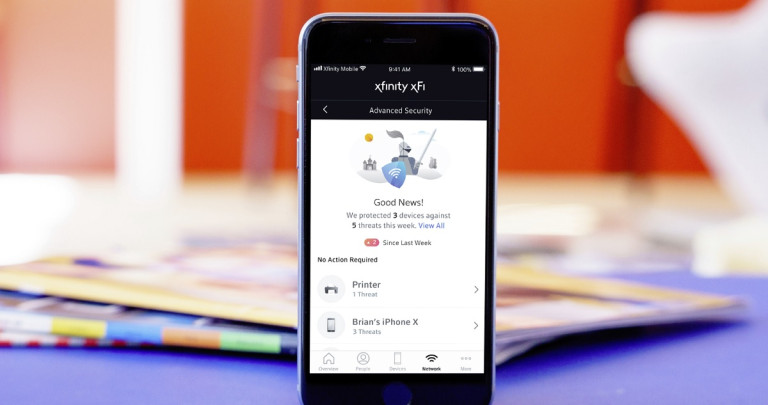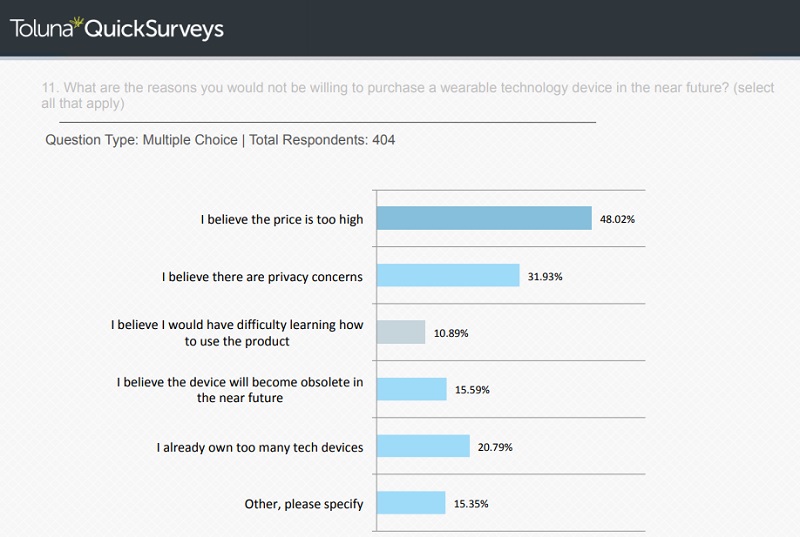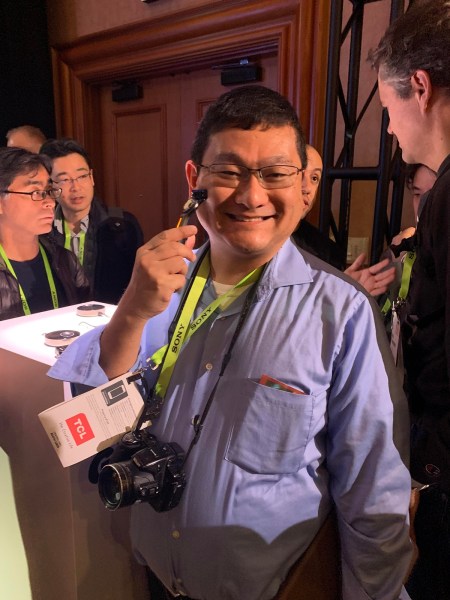CES is the big tech trade show that geeks and technology companies eagerly await each year. But how much do consumers really like what they see as it gets unveiled in the big tech trade show in Las Vegas? Apparently the average consumer isn’t as enthusiastic as we techies are.
Toluna, an on-demand consumer insights company, ran a QuickSurvey poll for VentureBeat, asking questions about the stories that we wrote about during the past week. More than 1,000 U.S. consumers between the ages of 18 and 55 responded, and the results are telling.
Of those surveyed, 59 percent said they didn’t own products in any of the major categories at the show. About 20.3 percent of respondents said they owned speech recognition or voice search products like Amazon Alexa. Some 14.5 percent said they owned wearable technology devices, and 14.4 percent said they owned virtual reality goggles or headsets. Only 13.3 percent said they had facial recognition technology, and 11.85 percent said they had smart home or internet of things devices. The lowest category was augmented reality glasses, which were owned by just 6.3 percent of the respondents.

Above: Most people don’t own any of the major product categories at CES 2019.
Some of the other results show:
June 5th: The AI Audit in NYC
Join us next week in NYC to engage with top executive leaders, delving into strategies for auditing AI models to ensure fairness, optimal performance, and ethical compliance across diverse organizations. Secure your attendance for this exclusive invite-only event.
- A majority of respondents (54 percent) would not consider purchasing self-driving or driverless cars.
- 45 percent would be interested in Comcast’s advanced security home service system.
- A third of respondents would be interested in purchasing health-related wearables within the next year.
- More than 55 percent would be interested in trying or purchasing Procter & Gamble’s IoT products.
TV buyers?

Above: LG OLED TV R can roll itself up or down.
About 34 percent said they were not interested in buying a new TV. But among those who were, the ability to connect to home Wi-Fi is the main reason to buy one, according to 24 percent of respondents. Seventeen percent said that higher resolution would compel them to buy a new TV.
Comcast security

Above: Comcast’s Xfinity security service.
Comcast announced an advanced Xfinity security service for home cable modem users, which 45 percent said they were interested in, while 30.2 percent said they were not and 24 percent didn’t know.
Laptop buyers?

Above: The Alienware Area-51m with Legend design.
Of those surveyed, 23.7 percent said they weren’t interested in buying a new laptop. But 23.3 percent said fast processing speed was a reason to buy one; 18.1 percent said longer battery life was another reason, and 9.9 percent said durability was.
Asked if they were gamers, 34.3 percent said yes and 65.6 percent said no. Eighteen percent said they would buy gaming laptops with the latest graphics, 30 percent said they would buy monitors or laptops with integrated privacy screens, 15.3 percent said they would buy gaming laptops with thinner designs, and 13.9 percent said they would buy desktop replacement gaming laptops.
Wearable buyers?

Above: The Omron HeartGuide reads your blood pressure.
Wearables like the Omron HeartGuide, which measured blood pressure, were popular at CES 2019. While 40 percent said they wouldn’t buy wearables, 38.6 percent said they would buy a wearable to track general fitness; 36.2 percent said they would buy one to monitor health signals; and 28.5 percent said they would do it to improve sleep quality. Just 11.1 percent said they would buy one to improve sports performance.
For those who were unwilling to buy a wearable, 48 percent said the price is too high, 32 percent had privacy concerns, 11 percent said it would be hard to learn, 15.6 percent said it would become obsolete, and 20.8 percent said they already owned too many tech devices.

Above: The case against wearables.
Among the wearables we wrote about, 29.7 percent said they would buy a watch that uses body heat and solar power to provide battery life, like the Matrix Industries PowerWatch 2. Some 36.4 percent said they would buy custom insoles for their feet, 16.4 percent said they would buy lightweight augmented reality glasses, 15 percent said they would buy lightweight mixed reality glasses, and 33 percent said they would buy health-related wearables that track signals like blood pressure. But 36 percent said they would buy none of the above wearables.
In terms of other devices, 24.7 percent said they would buy AI sensors that track driver movements in cars for driving security; 17.5 percent said they would buy AR for heads-up displays in cars; 20.4 percent said they would buy automated home devices like smart toilets; and 23 percent said they would buy foldable smartphones. But 50 percent said they would buy none of the above.
Driverless cars?

Above: Carsten Breitfeld, CEO of Byton, shows off the car’s 48-inch screen.
About self-driving cars, 53.7 percent said they would not consider buying one, 26.8 percent said they would, and 19.4 percent said they didn’t know. Of those who said they would not, 48 percent said they enjoy driving and like having control over the car; 34 percent said the cars would be prone to accidents; and 13.6 percent said they thought the price was too high.
Procter & Gamble?

Above: Gillette’s heated razor
Procter & Gamble came to the show for the first time in its 182-year history. Of the products it announced, the most popular was an online beauty tool that makes custom skincare recommendations using artificial intelligence, coming in at 26 percent approval.
Overall, 20.6 percent said they would buy a travel learning lab kit for skin care counseling; 23.3 percent said they would buy a connected smart home fragrance device that can distribute custom levels of scent; 24.8 percent said they would buy a toothbrush with AI; 20.3 percent said they would buy a device that scans, detects, and temporarily corrects blemishes; 16.7 percent said they would buy a self-heating razor; and 15 percent said they would buy an engineered soap that can clean using less water.
Why buy any technology?

Above: Sign at CES 2019.
Lastly, when the survey asked why people would buy new products, 40.3 percent said they would do it for entertainment purposes; 25 percent for automating tasks; 29 percent for measuring behavior data; 37 percent for security purposes; 26 percent for privacy reasons; 13.3 percent to share on social media; 17.8 percent for a better gaming experience; and 9.6 percent said for receiving more personalized ads. And 25.6 percent said they were not interested in buying new technologies.


